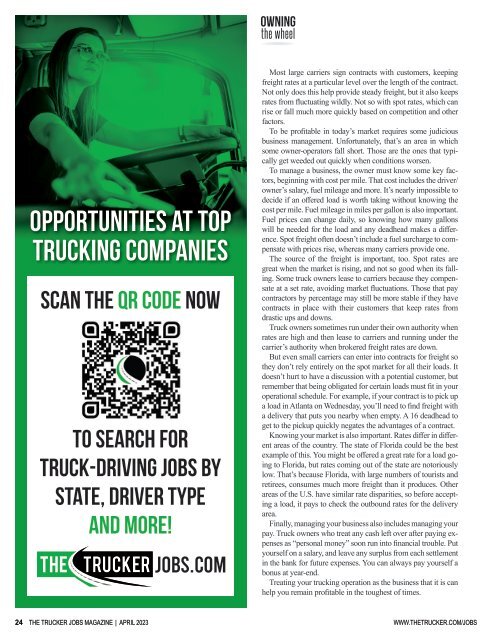You also want an ePaper? Increase the reach of your titles
YUMPU automatically turns print PDFs into web optimized ePapers that Google loves.
OWNING<br />
the wheel<br />
opportunities at top<br />
trucking companies<br />
SCAN THE QR CODE NOW<br />
TO SEARCH FOR<br />
TRUCK-DRIVING JOBS BY<br />
STATE, DRIVER TYPE<br />
AND MORE!<br />
JOBS.COM<br />
Most large carriers sign contracts with customers, keeping<br />
freight rates at a particular level over the length of the contract.<br />
Not only does this help provide steady freight, but it also keeps<br />
rates from fluctuating wildly. Not so with spot rates, which can<br />
rise or fall much more quickly based on competition and other<br />
factors.<br />
To be profitable in today’s market requires some judicious<br />
business management. Unfortunately, that’s an area in which<br />
some owner-operators fall short. Those are the ones that typically<br />
get weeded out quickly when conditions worsen.<br />
To manage a business, the owner must know some key factors,<br />
beginning with cost per mile. That cost includes the driver/<br />
owner’s salary, fuel mileage and more. It’s nearly impossible to<br />
decide if an offered load is worth taking without knowing the<br />
cost per mile. Fuel mileage in miles per gallon is also important.<br />
Fuel prices can change daily, so knowing how many gallons<br />
will be needed for the load and any deadhead makes a difference.<br />
Spot freight often doesn’t include a fuel surcharge to compensate<br />
with prices rise, whereas many carriers provide one.<br />
The source of the freight is important, too. Spot rates are<br />
great when the market is rising, and not so good when its falling.<br />
Some truck owners lease to carriers because they compensate<br />
at a set rate, avoiding market fluctuations. Those that pay<br />
contractors by percentage may still be more stable if they have<br />
contracts in place with their customers that keep rates from<br />
drastic ups and downs.<br />
Truck owners sometimes run under their own authority when<br />
rates are high and then lease to carriers and running under the<br />
carrier’s authority when brokered freight rates are down.<br />
But even small carriers can enter into contracts for freight so<br />
they don’t rely entirely on the spot market for all their loads. It<br />
doesn’t hurt to have a discussion with a potential customer, but<br />
remember that being obligated for certain loads must fit in your<br />
operational schedule. For example, if your contract is to pick up<br />
a load in Atlanta on Wednesday, you’ll need to find freight with<br />
a delivery that puts you nearby when empty. A 16 deadhead to<br />
get to the pickup quickly negates the advantages of a contract.<br />
Knowing your market is also important. Rates differ in different<br />
areas of the country. The state of Florida could be the best<br />
example of this. You might be offered a great rate for a load going<br />
to Florida, but rates coming out of the state are notoriously<br />
low. That’s because Florida, with large numbers of tourists and<br />
retirees, consumes much more freight than it produces. Other<br />
areas of the U.S. have similar rate disparities, so before accepting<br />
a load, it pays to check the outbound rates for the delivery<br />
area.<br />
Finally, managing your business also includes managing your<br />
pay. Truck owners who treat any cash left over after paying expenses<br />
as “personal money” soon run into financial trouble. Put<br />
yourself on a salary, and leave any surplus from each settlement<br />
in the bank for future expenses. You can always pay yourself a<br />
bonus at year-end.<br />
Treating your trucking operation as the business that it is can<br />
help you remain profitable in the toughest of times.<br />
24 the trucker jobs magazine | APRIL 2023 www.TheTrucker.com/Jobs

















